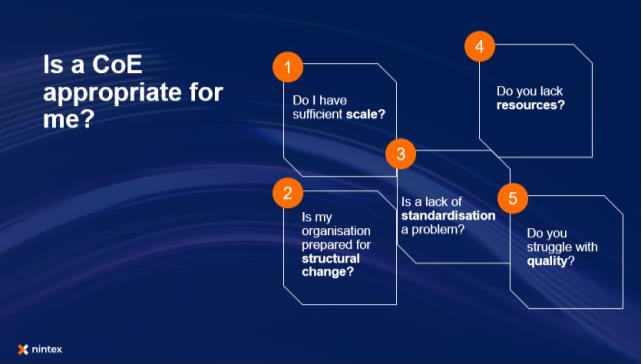Over the last several weeks we have defined what operational excellence is, highlighted the approaches for a Center of Excellence (CoE) and how to structure it. Within the CoE we discussed what business maturity is and how it can impact your CoE and wound up the material with governance, funding and how to measure success of your CoE. So, is a Center of Excellence right for you?

While a CoE can certainly add value, it’s not always going to be the most appropriate delivery approach. Before investing in, and setting up a CoE, a few questions need to be answered:
Is a CoE a fit for all Organizations?
Not necessarily. Establishing a full CoE will not be a fit for everyone, however certain elements of the CoE material might that we’ve discussed may still be relevant. For example, if an IT department is being overwhelmed with requests from the LoB to build solutions, they might just need to define an engagement process to formalize how requests are made, assessed, built etc. rather than building a CoE.
Does my organization’s profile lead itself to benefitting from a CoE?
The organizations who benefit from a CoE are generally going to be larger enterprises who are looking to leverage all parts of OPEX (people, process, technology, and leadership) across multiple lines of business and are ready and willing to make structural change.
If your organization is seeking to do the following, it’s a good sign that you are likely to benefit from a CoE:
· Establish better communication across the enterprise.
· Adopt a standardized approach to processes documentation and content creation to facilitate ongoing maintenance, governance, and or usage.
· Facilitate and maintain data truth to ensure that users trust the data.
· Coordinate and control their automation development efforts across the organization.
· Reduce their reliance on IT or certain individuals for important tasks.
Do I have enough scale to justify a CoE?
What a CoE is really all about is scaling efficiently – being able to deliver lots of use cases quickly with the minimum amount of effort, by reusing assets or leveraging highly skilled and experienced professionals. For this to work however, you need to have enough use cases to justify establishing a full-time team. If you only need a handful of use cases developed, it makes more sense outsourcing the development if you are unable to do it within your team.
Is your organization ready prepared for structural change?
Given that a CoE will change the way in which you operate (not to mention require funds and executive level support), you need to ensure that your organization is ready and accepting of such structural change.
Is a lack of standardization a problem?
Right now, if, in finance you are documenting and automating your processes completely differently to how the rest of the organization does, you are going to make it hard for other departments to work with you, not to mention you’re going to make your IT department’s life much harder than it needs to be as they are forced to manage all sorts of different technology. A CoE could solve this by creating and enforcing organization wide frameworks to establish how processes are managed and automated.
Do you lack resources?
If you are finding that you are unable to execute use cases because you lack the resources to build them, or you have use cases being built by people from within the LoB already but they are lacking the quality to be used in a production environment, then a CoE could be used to provide the necessary capability and capacity that you need to execute.
To summarize then, while a CoE can be an excellent execution model, it is not the only execution model. Depending on your circumstances you may well be better off training up an army of citizen developers or simply outsourcing to an external consultant. If, however the questions above resonated with you, it could well be time to take the plunge and establish your own CoE!
With that we are finished with our primer on the Center of Excellence which we hope you found to be a useful introduction. Stay tuned to our group as, over the coming months, we are going to do some deep dives on all things CoE.

